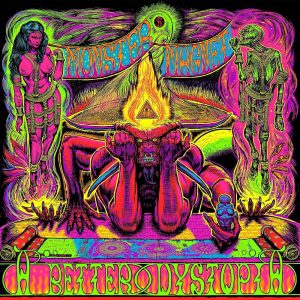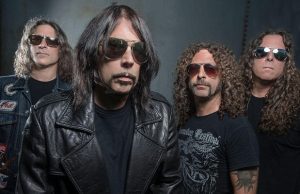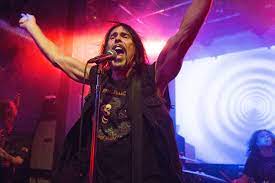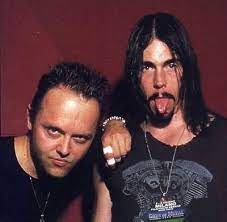HIT CHANNEL EXCLUSIVE INTERVIEW: October 2021. We had the great honour to talk with a legendary musician: Dave Wyndorf. He is best known as the lead vocalist, rhythm guitarist and founder of Monster Magnet, one of the best rock bands in the last 30 years. In May 2021, Monster Magnet released a covers album, “A Better Dystopia”, as a tribute to obscure psychedelic/heavy/garage bands mainly from the ‘60s and ‘70s. Read below the very interesting things he told us:
 How did you come up with the idea to make a covers album?
How did you come up with the idea to make a covers album?
Just because I had a lot of songs that I always wanted to sing. You know, I always wanted to sing these songs. Why I put them out? I thought that in the middle of Covid it was a good time to do it because I wasn’t touring. I had the time to do it.
Why did you choose Poobah’s “Mr. Destroyer” as the first single of the album?
Because I think it’s my favourite song in the album. It’s a killer song. That song is so cool. If that song had been performed by Black Sabbath or somebody more popular back then, it would have been an all-time classic. I just love that song.
The artwork of “A Better Dystopia” is fantastic. What is the concept behind it?
There’s a whole concept. It started off with a couple of ideas of mine; elements that I wanted to fill in there. I called this guy that I had just met -his name is Joe Tait, from Cleveland, Ohio who is a genius, just an artistic madman- and we discussed some of the things that I wanted to have in the elements of the artwork. I didn’t care how they were placed, I just wanted to be there. This is an album from a time where the world was really as crazy as it is now. Back then, in the late ‘60s and the early ‘70s from where the songs are from, the world was really-really crazy. If you just look in your history books, it was nuts. A lot like it is now. Crazy politics, riots just going berserk, plus drugs and rock, which means it was better. So, I discussed him riots, a band playing some giant old-school Woodstock-like festival, the bull guy coming from another dimension to destroy them and join them and he said: “Tell me no more, I’ll put all in there!” and he just came up with that stuff: These tiny little figures in that giant beautiful drawing that you can keep looking at forever. That’s when I said: “Wow, with all this stuff we can make lyric videos. We can put them on little videos and have them around. That’s how it all started: It really is just a couple of ideas from me and a lot of ideas from a man named Joe Tait.
All these bands you covered on “A Better Dystopia” (except Hawkwind) never made it big. Was their underdog status appealing to you?
Yes, they were very appealing because the songs were appealing first. The fact that they never made it big, a lot people. I mean, ‘70s songs or albums are not even on Spotify. That’s really off the radar. And they deserve it! They deserve to be heard. It’s kind of cool for me to do songs that are 50 years old that probably 5,000 people didn’t even hear in the first place.
 Do you think “A Better Dystopia” is also a good opportunity for younger people to learn about the music of Josefus, Morgen, The Pretty Things and others?
Do you think “A Better Dystopia” is also a good opportunity for younger people to learn about the music of Josefus, Morgen, The Pretty Things and others?
Sure, if they pick it up and they like it, yeah I am sure they will follow the directions. They can say: “Where this comes from? Where that comes from?” Like I said, the music is old now. It’s like 50 years old. 50 years is a long time in today’s world! I’m really happy with the way the songs hold up 50 years later. Just too cool shit.
Are there any songs that you would like to cover in the future?
Too many. There are so many songs, dude. I can’t even begin to think. I am supposed to be thinking about writing a new Monster Magnet record now and I can’t get these other songs out of my head. There are a lot of other bands out there that a lot of people haven’t heard. So, maybe I’ll do this again sometime in the next couple of years.
Do you think popular music that was written in the ‘60s and the ‘70s is much better than today’s music?
Using words like “better” is hard. Personally, for me, I thought they were more inventive. I thought they were spacier, I thought they were more interesting, individually interesting. I think if you listen to even this bunch of songs, which is pretty similar type of songs, the songs back then -for the most part- had more of an individual identity to each band, because heavy rock was just starting back then. It was brand new. Heavy rock started in 1967 with Jimi Hendrix and Iron Butterfly. So, these songs begin in ‘68-’69 when hard rock and heavy music were just born. They were taking all those kinds of chances. The way we are now is that hard rock has been alive for 50-60 years, I don’t hear any big difference in modern metal and hard rock. If I had to choose one over the other, yeah, I would say the music from that time was more interesting overall. Because it was a surprise like: “What’s this? What’s this?”
It seems that you are very happy with the current line-up of Monster Magnet, aren’t you?
Yeah, absolutely. These guys are so great and we had such a good time making this record. Everybody is into rock. Everybody in Monster Magnet right this time are true music lovers. We are like geeks. We get on the bus to tour and we play all night and write all night and we listen to music all night. So, it’s all I ever wanted, they are a bunch of guys that are funny and knew what good and funny music was. The good thing about rock is that it can be both ridiculous and cool at the same time. There is a sense of humour to it. There was a whole thing in old rock, that has all these little secret messages and stuff and it’s really cool. Unlike a lot of modern stuff: It’s deadly serious and it’s put me off. The people in the bands are very serious too and I couldn’t take it that. Don’t get too serious, dude.
Did you expect the commercial success of the “Space Lord” single (1998)?
No, no! I was really surprised. Very-very surprised and happy.
 It’s been 30 years since the release of “Spine of God”. What was the musical vision you had on that album?
It’s been 30 years since the release of “Spine of God”. What was the musical vision you had on that album?
What I was trying to do was to get a bunch of songs that I was busy lyrically writing about my teenhood. I wrote “Spine of God” and the lyrics to all that stuff when I was about 27 and that was in the ‘80s. All those songs were written about when I was 15 or 16. The experiences I had growing up in late ‘60s-early ‘70s New Jersey listening to those bands for the first time: listening to Black Sabbath, Led Zeppelin and Deep Purple when they first came out, it was all brand new. There was a drug culture, a stoner culture that was around that was the original stoner culture: Black light posters, all very-very strange, none grownups understood it at all because like I say, unlike now, there were no grownups involved in rock in 1970. None. It was all kids. Nobody over 25 was involved in rock ‘n’ rock at all, except for maybe the promoter. So, it was like a secret language and that was what I was writing about in “Spine of God” and telling stories from back then not only that were from my experience with other kids, but also from my imagination to what I thought a psychedelic experience would be. The kind of stuff that interested me when I was a kid: What was the connection between LSD and Satan, all the kids stuff, stuff that you loved when were a kid, like: “What is this?” and that was what “Spine of God” was about.
There’s a lyric in “Nod Sense” from “Spine of God” saying: “Bought another copy of ‘Fragile’”. Do you think the average stoner fan listens to albums like “Fragile” by Yes?
Back then they did, for sure. Today, I don’t know. Maybe stoners are different beasts today. I don’t know if the stoner musicians today would listen to Yes or they just listen to more stoner music. But when I 15 or 16 it was perfectly acceptable to have different records in your collection like: You can have Yes, Uriah Heep, Sly and the Family Stone, Alice Cooper, Miles Davis and maybe a Cat Stevens along with your Black Sabbath and stuff. It was all rock. It wasn’t really put into categories yet.
“Third Alternative” from “Dopes to Infinity” is one of my favourite songs ever. Would you like to tell us a few words about this great song?
“Dopes to Infinity” was written for and about the live crowd that I went out and saw during the first couple of records. I was in a punk band in the ‘70s but I never did a tour of Europe before. After “Spine of God” and “Superjudge” (1993) we actually did a lot of touring and I kept thinking: “I want to write a song about this”, about what I see and how I feel when I walk out and see people that actually are coming to see the band that I’m in. It was such a new experience like: “Wow, people are actually coming to see our band! This is awesome!” and I kept thinking: “We are gonna have a song that would be like the first song in the set. Something grand like ‘NA-NA-NA’” (ed: He mimics a heavy guitar sound) and that’s how I wrote that and that’s why were lines like: “We are all here, my friends, alive” (ed: from “Dopes to Infinity” song). It’s like a welcome to people.
 Are there plans for an album of new material?
Are there plans for an album of new material?
Yes, there are always plans, it never ends. I just discussed starting writing it. So, I should start writing it now. We are going to do some shows in the upcoming year, so in between those tours, we will do a tour of Europe next June and we will be doing Desertfest in New York City in May and then a thing called Psycho Las Vegas in August the next year. In between all that stuff I should be writing the next album.
In your opinion, what is the weakest Monster Magnet album?
To me, it was the one that didn’t have any control over or I had less control over because I was fucked up. I ODed on drugs. It was an album called… (pause) What the hell, I can’t remember my own album name. “4-Way Diablo” (2007). I had a problem with that because the songs were written at different times and I had to stick a bunch of songs to make an album. So, it seemed more like a collection of songs that weren’t written particularly for that album. I usually write songs for an album, to make a whole album, songs that complement each other. This one was not. But, you know, it happens. After you go for that long making albums, sometimes you win and sometimes you lose.
Did you enjoy touring with Metallica in 1999, when you played in Greece for the first time?
That was fucking awesome. It was amazing. I mean, Metallica? You are touring with Metallica and there is an automatic crowd of thousands and thousands and thousands people. So, automatically you ‘ve got such a great opportunity. That was also my first time ever in Greece. I will never forget that show not because of Metallica and not because of the show, but because of the food. It was the best food I have ever eaten in my life! Dude, I couldn’t believe how good real Greek food tastes. I was just flipped out. It was like: “Where I have been all my life? Why haven’t I been here?”
You watched Kiss live at the Academy of Music in Manhattan opening for the Blue Oyster Cult and Iggy and the Stooges. How much impact did that show have on you?
It was like: “How much can you take?” I was 16, 15. Even now when I think about it like: “What did you just see?” I walked out of that place as a teenager going. I can’t process how much I saw that night. It was so much good music and Iggy looked like somebody from another planet: He had dyed platinum hair and platinum pants on. Rock stars don’t often really look that good. Do you know what I mean? He really-really-really looked like a fucking rock star. He looked like he was from another planet. As a kid I just thought: “Who is that man?” and the music was fucking insane, it’s just Stooges and then opened the show this new band that no-one ever heard about called Kiss and it just blew us away. I mean, there was Alice Cooper back then but nobody wore all make up and they were all like Alice Cooper and they did it in a way that was so overt and so bad banging. Songs like “Deuce” and “Firehouse” have “dang-dang” (ed: He mimics heavy drum sound) and we just freaked out. And of course Blue Oyster Cult at the end, it was just amazing because Blue Oyster Cult had at that point three of some of the finest hard rock albums ever made. You know, the first three Blue Oyster Cult albums. Every song in their set was good. It changed me in a significant way: To think that a night could be that full of good stuff.
 I know that you like The Doors. Could you explain to us why bands like The Doors and Soft Machine are considered uncool nowadays?
I know that you like The Doors. Could you explain to us why bands like The Doors and Soft Machine are considered uncool nowadays?
I don’t know. Are they? Who considers what? Kids? Kids may not like them. I don’t know if they are considered uncool but I guess they are considered old. So, being old is automatically uncool for a while.
But some others are considered cool. There are some categories. I don’t know in America, but in Greece it’s uncool to say: “I like Soft Machine or The Incredible String Band or Fairport Convention”.
I love it all. You know and I know that we both probably grew up listening to records. You realise that some people have a mentality towards music that’s more like a high schooler going: “Oh, I only listen to what is cool. So, this is uncool”. But at one point in your life you have to make a decision: Am I going to be cool or am I going to enjoy things for what they are? I choose to enjoy things for what they are. So, I can listen to Fairport Convention and go: “Now, this is good” but it’s like historical artifacts from another time and I like it for its historical, archeological merit. It’s a diary of another time when English folk music was big. I don’t spend that much time saying what is cool and what is not cool anymore, not like when I was a kid.
I don’t like to say “This is uncool” but I’m angry. I think some older stuff seems newer than some later stuff. I think King Crimson are newer than Saxon, but Saxon came later than King Crimson. I think King Crimson were much ahead of their time.
Dude, those guys were like 20 years ahead of their time.
That’s why sometimes I am getting mad because I don’t look at the release date, I listen to the music. You covered Grand Funk Railroad, I think they were much ahead of their time than Manowar. But if you look at the release date they were 10 years before.
Oh, yeah. I mean, I agree. Again, I can’t stress how much I’m in love with music from that time period. There’s a reason that there is so much interesting stuff in heavy music, from say about ‘67 to ‘75. Loud music and the way loud music was presented was new. Amps were never that loud before, people didn’t even have the concept of playing heavy. They couldn’t. Amps were not that big. Big amps were only invented for Jimi Hendrix in ‘67 and the PA systems weren’t loud. The whole concept of “dan-dan-dan” (ed: He mimics a heavy guitar sound) wasn’t invented yet. It was brand new. So, in that time it was almost like an artistic renaissance. Most of the things that we have seen since then were worked out someway in those 5 or 10 years.
Everything we ‘ve seen from that time has been just variations of what those guys invented. It’s just variations of it. It’s just like art. Like these guys taught them how to put the brush this way and Manowar said: “Oh, Ok. We ‘ll take it for our show to go “dan-dan-dan” just like Grand Funk, except we’ll turn it up even louder” but is that much different? Did they come up with something really new? No. They did not. It’s not that I’m complaining that everyone should make brand new music all the time, but we haven’t an artistic renaissance and that’s what we had in ‘60s and ‘70s. It stands to reason that most people would go and do variations of that ever since and that’s what it is. I love looking back and see where the stuff started. I mean, you can talk about Black Sabbath seriously starting the heavy movement and Led Zeppelin and you can see it all there.
 But then, you listen to Cream and Pink Floyd’s “The Nile Song” and you see that they came before Black Sabbath.
But then, you listen to Cream and Pink Floyd’s “The Nile Song” and you see that they came before Black Sabbath.
Yes (ed: makes a thumps up sign on Skype), but just like a year before. They were all there. We are talking about Black Sabbath and all that stuff, all those bands lived in the same tiny country. They all watched each other. We are only talking like 6 months here, 7 months. Amazing time! If you look at Cream and before them, I’m sure somebody would say: “How did they get that sound on those Kinks albums a year before?” They sounded a little heavier (ed: he mimics a guitar riff) and you can go back before and maybe say: “Oh, in America it’s a Link Wray. Oh, he sounds a little heavy”. Everything was people watching each other and started to build on it and then watched the technology that came in and the big amps. The sound has changed. Cream formed right around the time that Hendrix was there. I think Cream formed around the same time as Hendrix.
A little before. Cream released their first album (“Fresh Cream”) in ‘66.
I’m glad you mentioned “The Nile Song” (1969), because “The Nile Song” it never gets mentioned in people’s reviews as one the first big, heavy songs.
Because it destroys the myth that Black Sabbath created everything. You love Blue Cheer, these things are before Black Sabbath.
Yes. You are absolutely right. And of course, Zeppelin who were remnants of The Yardbirds. Zeppelin were ahead of Black Sabbath by about 6 months. I think the reason people say Sabbath so much is that they were so dedicated to the consistency of the heavy sound, while these other bands made often blues jams and mellowed down stuff. Black Sabbath were just full on almost every song, heavy and they used minor chords and I think that’s why they get remembered, because they were consistently over the top. They didn’t vary their records like some of these other guys did. But yeah, I can just imagine like that if I was an adult in those times say like 24-25 I wouldn’t be able to keep up with all those bands. There were a lot of good bands starting out. “Who’s this?”
I think from the year The Beatles hit really-really big and inspired people to start groups. Beatles were really-really important. The Beatles inspired people to be a group. Before that, there was no inspiration to be a group, there was an inspiration to be a star. You wanted to be Elvis or Eddie Cochran or Duane Eddy, but you didn’t want to be a group. You wanted to be the star. The Beatles told everybody it’s cool to be a group and it’s cool to write your own songs. Then, all those bands got together said: “Shit! What a right!” From ‘64 to 1970 you would think you were living on a different planet. By the time ‘69 came around or ‘70, all those sounds; big, heavy sounds. Cool time.
 Are you frustrated that everybody thinks that you are a crazy badass? I think you are a very sophisticated person.
Are you frustrated that everybody thinks that you are a crazy badass? I think you are a very sophisticated person.
(Laughs) No, it doesn’t bother me. I don’t think that hard about it anymore, about what most people think of me. It’s a different world, as far as the press is concerned and I think I talk enough. So, if anyone wants to really find out what I really was, they can look it up on Youtube. When I play live, it just something happens to me. I’ m just like “Argghh!!” (ed: a crazy scream), really-really into this whole thing. That’s probably from where I get the reputation for being a badass.
You met Lemmy and Wayne Kramer (MC5 -guitars) in 1978. Would you like to tell us about that interesting story?
It was amazing and I think I was maybe 20something, early 20s, or 19 or 20. I was just a little kid. Basically, I felt like a little kid. In my first band, Shrapnel, we were looking for someone to produce our first single and someone suggested Lemmy. Some friends of ours in New York. So, I went to New York to stay with a girlfriend of mine and she knew Lemmy and said: “Alright, I ‘m gonna take you down”. She was older than me. Of course, she was 30 or something and said: “I’m gonna take you down to Max’s Kansas City” -Max’s Kansas City was still open- “and you are gonna hang out with Lemmy and I’ll see you later. Here’s the key to my apartment”. I didn’t come back for about 12 hours because I hung out and met Lemmy and he was hanging out with Wayne Kramer from MC5 who had just come out of jail. He had been in jail since the early ‘70s or the mid ‘70s when he got arrested. I hung out with them at Max’s and we smoked weed and did crystal meth.
All fucked up! Because those guys insisted: “You have to do it”. That’s the way it was back then. There was no choice: “You hang out with us, you do our drugs”… and plenty of beers. When Max’s closed which was at about 4:00 in the morning -that’s when things close- we walked through an empty Manhattan with Lemmy and Wayne Kramer talking about MC5 songs. Lemmy would go like: “What kind of guitar did you play on this?” and Wayne replied: “Oh, I played this about” and I couldn’t believe I was there. I was just a little bird following them as they talked. We went to Lemmy’s apartment at the Chelsea Hotel, the place where Sid Vicious’ girlfriend, Nancy Spungen died, hanging out there for hours and hours and finally those guys kept going, but I had to go. I was fried, they were much more professional in their drug taking than I was. They would go on forever. They had a bunch of boxes and they were listening on the new technology of the time, which was the cassette walkman. It was brand new. They were like: “Look, it’s a cassette walkman”. What a night! I was totally inspired.
Do you have any musical ambitions left?
Yes, I think I do. Some of them I don’t think they would be that appreciated being coming under the name of Monster Magnet. Maybe they are so mellow and weird but at this point I don’t quite know what to do. I never planned to be in a band for about 30 years. It’s surprising. I think what I will do is just continue to do what I think is right for Monster Magnet and for myself musically and see how it works out. I’m not trying to worry too much about what you are supposed to do as far as the fans are concerned. I’m pretty much trying to concentrate to what I would like to do, because I am hoping in the end what’s what the fans want anyway.
What is so special about your relationship with Greece?
Some of the most passionate people I have met in my life come from Greece. With Greece, is the people. For the minute I went there, they were some of the nicest people I have ever met. I met a lot of nice, good people. I was lucky. This was personally. Then, we played in front of the crowds and the crowds had a look on their face that I had when I was like 14, except they were in their 20s. I said: “This is a good place. This is a place where people listen”. They are listening with their heart and soul and I was into it. Then, I ‘ve got to say there was enough food. The food was so good, like I was deprived my whole life. So, it’s pretty magical. Plus Greece is pretty interesting because it’s tough there. People live a hard life in Greece. Ever since I ‘ve been going there they are getting fucking trouble every goddamn year. They are riots or fires. I don’t come from a place like that. I come from a place where everything in my little spot is pretty much the same and I go to Greece and I’m to talking to a friend of mine: “Hi, how are you doing?” and he says: “Oh, some 17,000 acres just burned out!” Holy shit! Or “The Germans are taking our money away” or “We are having riots in fuckin’ Athens”. I say: “Oh, holy shit. How do you survive?” and he says: “Well, we’ll do it”.
 Keith Emerson told me: “It was a huge event when The Beatles had a new album out: You should listen to John Lennon’s lyrics, you should listen to Paul McCartney’s bass, you should listen to George Harrison’s guitar. Nowadays, nobody gives a shit about who the guitar soloist is on a Lady Gaga album”. Do you agree with this?
Keith Emerson told me: “It was a huge event when The Beatles had a new album out: You should listen to John Lennon’s lyrics, you should listen to Paul McCartney’s bass, you should listen to George Harrison’s guitar. Nowadays, nobody gives a shit about who the guitar soloist is on a Lady Gaga album”. Do you agree with this?
I totally agree with it. Basically, mainstream music for the most part is totally pop. And pop means one star, one focus. It’s about the personality first and the song second. There is no room for anybody else in that equation. It’s not rock. That’s how I define rock over anything: It’s not a sound. Rock is a thing that is appreciated by people, by the individual members, in bands and the combination of people that made the music. Pop is about a winning song and a winning personality. And that’s it, now. Nobody gives a shit who plays the guitar or if the drums are even real. It’s a whole different thing. It’s a lot less sophisticated. Rock is pretty sophisticated in that way. Now, rock is only 15% of the world market for music. 15%! That’s really low! So, once again, rock is an outsider music. It’s almost like jazz was in the late 1960s. Jazz went big in the ‘30, ‘40, ‘50s, early ‘60s. Jazz was king. And then it fell. Rock took it over. Now rock has been hit down by pop, but rock has not going away. There is going to be this special niche, like jazz. Which is not particularly bad. I just hope it brings enough young people to it. That’s my only worry.
A huge “THANK YOU” to Mr. Dave Wyndorf for his time. I should also thank Lisa Gratzke from Napalm Records.
Official Monster Magnet Facebook page: https://www.facebook.com/monstermagnet/
Buy “A Better Dystopia” here: https://napalmrecords.com/english/a-better-dystopia-digipak-cd.html

